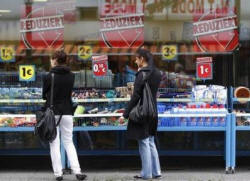|
Data from six states showed annual inflation
rates ranging from 0.6 percent to 1.1 percent. Economists had
forecast that the preliminary national rate, due out at 2 p.m.
(8 a.m. EDT), would show consumer prices climbed by 1.1 percent
on the year.
In North Rhine-Westphalia (NRW), Germany's most populous state
and traditionally a bellwether for the national data, consumer
prices increased by 1.1. percent on the year, their lowest
annual rate since Sept. 2010.
But ING economist Carsten Brzeski said data from some other
states showing weaker inflation would probably push the national
figure down below 1 percent.
"It shows euro zone inflation could be weaker than expected,
increasing pressure on the ECB to act on Thursday," he said.
Euro zone inflation stood at 0.7 percent in April - well below
the ECB target of close to but just below 2 percent - and a
Reuters poll shows economists expect data due out on Tuesday to
show it held steady in May.
Brzeski said he expected the central bank to cuts its deposit
rate into negative territory at its June meeting and continue to
offer banks unlimited access to its funding until the end of
2015 or mid-2016.
Last week ECB Vice President Vitor Constancio said the ECB was
not complacent about the risks from a protracted period of low
inflation and would act if necessary while Governing Council
member Ignazio Visco said excessively low inflation in the euro
zone should be dealt with as firmly as high inflation.
Jennifer McKeown, senior European economist at Capital
Economics, said a weighted average of data from six German
states suggested the harmonized index of consumer prices (HICP),
the measure used by the ECB, probably fell to a four-year low of
0.8 percent or even lower in May from 1.1 percent in April.
That would be far lower than expected - economists polled by
Reuters had forecast that consumer prices harmonized to compare
with other European Union countries would rise by 1.0 percent on
the year.
(Reporting by Michelle Martin; Editing by Noah Barkin)
[© 2014 Thomson Reuters. All rights
reserved.] Copyright 2014 Reuters. All rights reserved. This material may not be published,
broadcast, rewritten or redistributed.
 |
|






